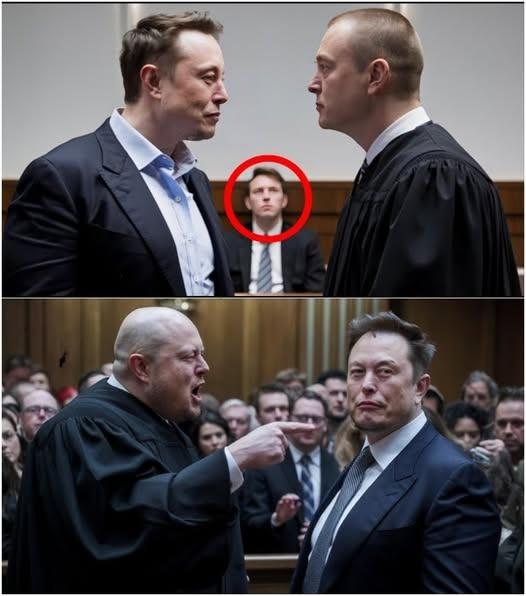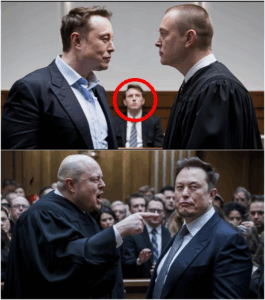Elon Musk Faces the Judge’s Wrath—But the Twist No One Saw Coming
The courtroom was tense, every eye in the room fixed on Elon Musk, who sat at the defendant’s table with his trademark calm. He’d faced controversy before, but nothing quite like this. His reputation and legacy hung in the balance, and the world was watching.

Judge Samuel Row was infamous for his sharp tongue and no-nonsense approach. As he entered, the air thickened. “Well, well, well,” Row began, his voice slicing through the tension. “The richest man in the world, yet here you are, defending yourself against allegations. How fitting.” The crowd chuckled, but Musk’s expression didn’t flinch.
“You’d think with all that money, you’d learn to avoid a mess like this, wouldn’t you, Mr. Musk?” Row continued, a sly grin on his lips. “But I suppose when you’re used to shooting rockets into space, little things like lawsuits must seem pretty small by comparison.”
The words stung. Musk was used to media attacks, but this was personal. He glanced at his legal team, who looked tense and uncertain. He’d hired the best, prepared for every scenario, but nothing could have prepared him for being the butt of a judge’s jokes in front of millions.

“Your Honor,” Musk began, voice steady but with an undercurrent of unease, “I’m here to address the concerns raised in this case—”
“Oh, we know why you’re here, Mr. Musk,” Row interrupted, waving a dismissive hand. “You’re here to make sure your billions aren’t threatened by some little legal hiccup, aren’t you? But in this room, you’re just another man in the hot seat.”
Musk felt the temperature rise. He’d faced adversity before, but never like this. Judge Row leaned in, lowering his voice for emphasis. “Not everything can be solved with a Tesla or a flamethrower, Mr. Musk. Some problems require a little thing called accountability.”
The word echoed in Musk’s mind. He’d always seen himself as a visionary, someone who could break the rules to shape the future. But today, the future seemed uncertain.
Row’s roasting continued, each barb sharper than the last. “I’ve seen you on Twitter, Mr. Musk,” he said, narrowing his eyes. “Tweeting your way through life like a man who’s never had to answer to anyone. Well, here’s a reality check. This is a courtroom, not a social media platform.”
Musk’s face betrayed nothing, but inside, he was reeling. He’d always thrived under pressure, but this was different. This was an attack on his very identity.
“I’m here to present my case, Your Honor,” Musk said, voice steady. “I believe in the evidence we’ve gathered. I am not above the law.”
Row smirked. “You’re right about one thing, Mr. Musk. You’re not above the law. But you certainly act like you are.”
A collective gasp rippled through the courtroom. The judge’s words hung in the air, heavy and inescapable.
Row leaned forward, eyes never leaving Musk’s. “Let’s see how you handle this, Mr. Musk. Because if you think you can just breeze your way through this trial, I’ve got news for you. This is going to be a long, hard road—and you’re in for a wake-up call.”
With that, Row slammed his gavel. The trial had begun.
As the proceedings continued, Musk’s mind wandered back to his journey. Born in Pretoria, South Africa, he’d faced adversity from a young age. His parents’ divorce, a strained relationship with his father, and a sense of always being different had shaped him. He’d left home, crossed continents, dropped out of Stanford after two days, and built empires from nothing—Zip2, PayPal, Tesla, SpaceX.
He’d always been a fighter, thriving on impossible odds. But this trial was different. This was a battle not just for his companies, but for his name.
Row’s attacks didn’t stop. “You’re a genius, Mr. Musk, aren’t you?” he sneered during cross-examination. “A visionary. But when it comes to facing accountability, you shrink. It’s almost laughable.”
Musk felt the sting. He thought of the sleepless nights, the sacrifices, the people who believed in his vision. But he also remembered the critics, the skeptics, and now, this judge who seemed determined to tear him down.
“Judge, with all due respect,” Musk said, voice strained, “this trial is about facts, not personal attacks.”
Row’s eyes narrowed. “This trial is about truth, Mr. Musk. And the truth is, you’ve built your empire on the backs of others. Now it’s time to pay the price.”
Musk’s hands tightened on the table. “I built my company on hard work and innovation. I didn’t ask for this.”
“No, you didn’t,” Row replied. “But now you’ll have to face the consequences. And no amount of money or influence can change that.”
During a recess, Musk’s legal team huddled around him. “Don’t let him get to you,” his lead attorney whispered. “We have the evidence. Stay focused.”
But Musk couldn’t shake the feeling that this was more than a trial. It was a reckoning. And Row wasn’t just an impartial judge—he was an adversary with a personal vendetta.
The next day, as the trial resumed, Row’s demeanor shifted. He was colder, more calculating. “You think you can manipulate things to your advantage, Mr. Musk,” he said. “But I’m here to show you that there are consequences to your actions.”
Musk felt cornered. He knew he had to fight back, but how? Then, in a flash of inspiration, he realized the only way out was to expose Row’s bias.
That evening, Musk called his private investigator. “Find me anything on Judge Row,” he ordered. “Anything that proves this is personal.”
The investigator worked quickly, and within days, uncovered a series of financial transactions linking Row to Musk’s competitors. It wasn’t outright bribery, but it raised serious questions about the judge’s impartiality.
Musk’s team prepared a media blitz. The next morning, headlines exploded: “Judge in Musk Trial Linked to Competitors—Calls for Investigation.”
The courtroom was in chaos. Row tried to maintain control, but the damage was done. “Your reputation is already in ruins,” Musk said, voice steady. “The truth has been exposed.”
Row’s face drained of color. The evidence was overwhelming. The court called for an emergency review. Row was removed from the case, and a mistrial declared.
But the fallout didn’t end there. The investigation into Row revealed a web of corruption involving high-profile business and political figures. The very system Musk had fought against was being exposed.
Musk, once on the brink of ruin, was vindicated. The media, once divided, now hailed him as a whistleblower and survivor. His companies rebounded, his reputation restored.
But Musk knew the fight wasn’t over. The conspiracy ran deep, and there would always be new challenges. As he stood before the cameras at a press conference, he spoke not just of victory, but of resilience.
“I’ve always believed in pushing boundaries,” Musk said. “But the most important thing I’ve learned is this: the truth always comes out. No matter how powerful your enemies, never stop fighting for what’s right.”
The world watched, speechless—not just at the courtroom drama, or the judge’s downfall, but at how Musk had turned the tide, exposing corruption and proving that sometimes, even the most powerful can be brought to justice.
And as he walked away from the courthouse, Elon Musk knew that this was only the beginning of a new chapter—a chapter where the fight for truth would never end.